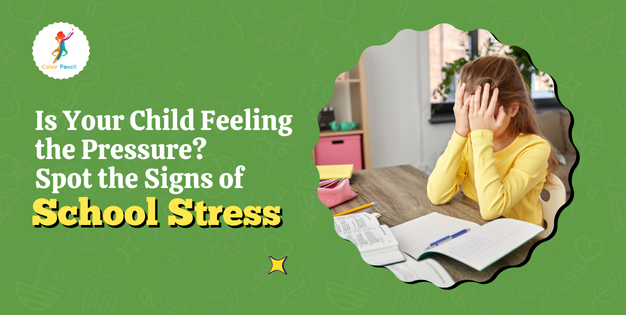It’s no secret that today’s kids face an incredible amount of academic pressure. Between homework, tests, extracurriculars, and the constant push to succeed, many children are feeling the weight of academic expectations. As parents, it can be hard to know when this pressure crosses the line from healthy motivation to overwhelming stress.
Recognizing the signs early is crucial to helping your child stay balanced. In this guide, we’ll break down how to spot academic stress and offer practical tips on how to help your child manage it.
What Does Academic Pressure Look Like?
Stress can manifest in many ways, and it doesn’t always look the same for every child. It’s not just about falling grades; it can also show up in unexpected behaviors or emotions.

Here are some key signs of academic stress to watch for:
- Physical Complaints: Unexplained headaches, stomachaches, or fatigue.
- Emotional Outbursts: Increased irritability, frustration, or crying over assignments.
- Sleep Issues: Trouble falling asleep, waking up in the middle of the night, or sleeping excessively.
- Avoidance: Procrastination or avoidance of schoolwork or discussions about grades.
- Perfectionism: Becoming upset over small mistakes or obsessing over grades.
Understanding how your child responds to stress can help you spot when something isn’t quite right. Every child reacts differently, so trust your instincts as a parent to gauge what feels off.
Why Are Kids Feeling So Much Pressure?
Today’s academic environment can be intense. Kids are juggling school, extracurricular activities, and the pressure to succeed academically and socially. Here are a few common sources of stress:

- School Demands: Increasingly rigorous curriculums and standardized tests place high expectations on students.
- Parental Expectations: Even well-meaning encouragement can sometimes feel like pressure, especially if children feel they need to “perform” for approval.
- Peer Pressure: Social media and comparisons with classmates can make kids feel like they’re falling behind.
- Future Fears: The emphasis on getting into “the right” college or achieving long-term success can feel like a heavy burden, even for younger children.
Knowing where this pressure is coming from is key to supporting your child and reducing stress.
How to Support Your Child Under Academic Stress
If you suspect your child is struggling, there are several ways to ease their stress and create a healthier balance. Here’s how to step in:

- Create a Safe Space for Conversations: Encourage open, non-judgmental discussions about their stress. A simple “How are you feeling about school?” can help start the conversation.
- Focus on Effort, Not Just Results: Celebrate the effort your child puts into their work rather than obsessing over grades. Remind them that mistakes are part of learning.
- Set Realistic Expectations: Help your child set achievable goals that balance school and activities. Prioritize quality over quantity, whether it’s schoolwork or extracurriculars.
- Teach Stress-Relief Techniques: Introduce your child to relaxation methods like deep breathing or mindfulness. Physical activities like stretching or even dancing to music can also help relieve tension.
- Lead by Example: Children often model their behavior after their parents. Show them how you manage stress and prioritize your own mental health.
When Should You Seek Professional Help?
If you notice that your child’s stress is impacting their daily life, it may be time to seek additional support. Signs to look for include:

- Persistent anxiety or physical symptoms (like stomachaches or headaches) related to school.
- Avoidance of school or academic activities altogether.
- An overwhelming sense of hopelessness or failure that doesn’t improve over time.
A school counselor, therapist, or pediatrician can provide valuable guidance if you’re unsure whether your child’s stress is manageable or if more serious help is needed.
FAQs About School Stress
1. What causes stress in kids?
Academic pressure, high parental expectations, peer comparisons, and concerns about the future all contribute to stress in kids. The combination of these factors can feel overwhelming.
2. How can I tell if my child is stressed?
Look for signs like emotional outbursts, physical complaints (like headaches), changes in sleep patterns, or avoiding schoolwork altogether. Every child reacts differently, so pay attention to their individual behaviors.
3. How can I help my child cope with stress?
Start by encouraging open communication, praising effort, setting realistic goals, teaching relaxation techniques, and modeling healthy habits yourself.
4. How can schools reduce academic stress?
Schools can help by fostering a balanced approach to learning, offering emotional support, and reducing the emphasis on performance alone. Social-emotional learning programs can also help.
5. When should I seek professional help?
If school stress starts affecting your child’s daily life—leading to ongoing anxiety, physical symptoms, or refusal to go to school—it might be time to seek help from a counselor or therapist.
Conclusion
As kids face more academic pressure than ever before, it’s essential to help them develop healthy coping strategies. By recognizing the signs of stress early, maintaining open lines of communication, and focusing on balance over perfection, you can help your child manage their stress and thrive both in and outside the classroom.
Remember, it’s not about achieving perfection—it’s about building resilience, emotional well-being, and a healthy approach to learning. With your support, your child can handle the challenges ahead and feel confident in their ability to succeed.
Last modified: December 5, 2024









